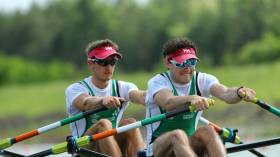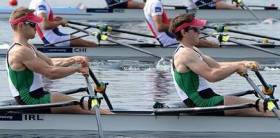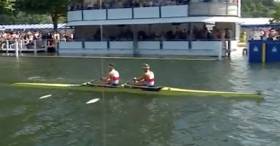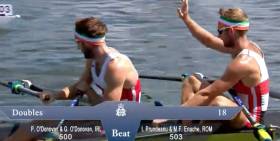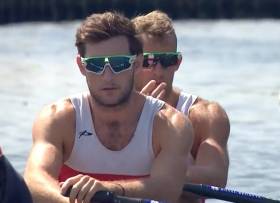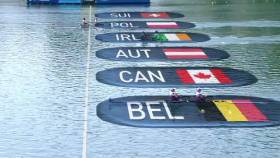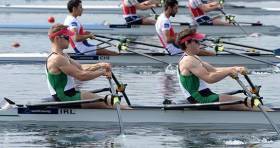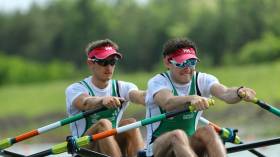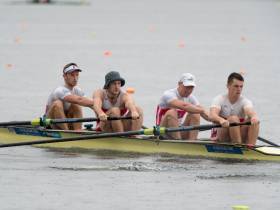Displaying items by tag: Paul O'Donovan
#Rowing: Paul O’Donovan and Gary O’Donovan won their heat to qualify directly for the semi-finals at the World Cup Regatta in Lucerne. The Ireland lightweight double scull took the lead from the start. They led Poland at halfway, but the Poles, who beat Ireland in the first World Cup in Belgrade, then took over. Austria pushed into the top three and these boats fought it out for two places. Ireland showed they had the speed in the dash to the line – and it was Poland who lost out, taking third.
Philip Doyle qualified for the quarter-finals of the single sculls with third place in his heat. Mahe Drysdale, the Olympic champion, was the likely winner, but Doyle led through the 500 metre mark. The big New Zealander took over and won. Sverri Nielsen of Denmark took second and Doyle was just behind him.
World Cup Regatta, Lucerne, Day One (Irish interest; selected results)
Men
Pair – Heat Two (First Four to Quarter-Final; rest to Quarter-Final or E Final): 1 Spain 6:40.29; 3 Ireland Two (P Boomer, P Harrington) 6:45.74
Heat Six (First Three to Quarter-Final; rest to Quarter-Final or E Final): 1 Croatia 6:37.66, 2 Ireland One (M O’Donovan, S O’Driscoll) 6:40.95.
Lightweight Double Sculls – Heat One (First two to A/B Semi-Finals; rest to Repechage): 1 Ireland (G O’Donovan, P O’Donovan) 6:17.43, 2 Austria 6:17.79; 3 Poland 6:17.91.
Single Sculls – Heat One (First Four to Quarter-Final; rest to Quarter-Final or E Final): 1 New Zealand (M Drysdale) 6:52.98; 3 Ireland (P Doyle) 6:55.18.
Women
Pair – Heat Two (First to A Final; rest to Repechage): 1 Canada 7:13.98; 6 Ireland (A Keogh, T Hanlon) 7:32.49.
Double Sculls – Heat Two (First Three to A/B Semi-Finals; rest to Repechages): 1 United States 6:58.58, 2 Ireland (A Crowley, M Dukarska) 7:03.05.
Single Sculls – Heat One (First to A/B Semi-Final; rest to Repechages): 1 Ireland (S Puspure) 7:26.51; 2 United States 7:40.98.
O'Donovans Head for Lucerne as Afloat Rowers of Month
#Rowers of the Month: Paul O’Donovan and Gary O’Donovan are the Afloat rowers of the month for June. Both brothers showed outstanding form at Cork Regatta. Paul O’Donovan won the single sculls. In the heats, Gary had not been the next fastest, but come the final the elder O’Donovan brother was second only to Paul. The two raced in the double, where they were tested by Fintan and Jake McCarthy, but came through with the win.
The O’Donovans were run close by David O’Malley and Shane Mulvaney. The UCD pair were outstanding at Cork Regatta. They won the pairs title, beating world lightweight champions Shane O’Driscoll and Mark O’Donovan, and they slotted into the UCD four which also won. O’Malley and Mulvaney form the Ireland lightweight pair in a strong team for the World Under-23 Championships this month. The O’Donovans, who went on to reach the final at Henley Royal Regatta, head for the World Cup in Lucerne next weekend (July 13th to 15th). Good luck to all those competing in this busy month.
Rower of the Month awards: The judging panel is made up of Liam Gorman, rowing correspondent of The Irish Times and David O'Brien, Editor of Afloat magazine. Monthly awards for achievements during the year will appear on afloat.ie. Keep a monthly eye on progress and watch our 2018 champions list grow.
#Rowing: Paul and Gary O’Donovan were beaten in the final of the Double Sculls Challenge Cup by Jack Beaumont and Angus Groom at Henley Royal Regatta today. The Skibbereen men blasted off the start, but the Britain heavyweight crew took an early lead. The O’Donovans came back at them but their steering was problematic and the umpire had to twice redirect them. Groom and Beaumont, rowing off the more favoured Berkshire station, went on to win by five lengths.
Henley Royal Regatta (Selected Results; Irish interest)
Double Sculls Challenge Cup (Open) – Final: A Groom, J Beaumont bt G O’Donovan, P O’Donovan 5l.
#Rowing: Paul and Gary O’Donovan won their semi-final of the Double Sculls at Henley today. The Romanian heavyweight crew of Ioan Prundeanu and Marian-Florian Enache matched the Skibbereen men in the first quarter. The race was effectively over soon after, as the Olympic lightweight silver medallists moved into a clear lead and stretched it to over four lengths. The Irish crew, wearing tricolour headbands, were cheered loudly as they passed the enclosures.
Henley Royal Regatta, Day Four (Irish interest; selected results)
Double Sculls (Open) Semi-Final: J Beaumont, A Groom bt K Brun, A Strandli ¾ l; G O’Donovan, P O’Donovan bt I Prundeanu, M-F Enache 2¼ l.
#Rowing: Paul O’Donovan and Gary O’Donovan won their first race at Henley Royal Regatta with plenty to spare. The Skibbereen double scull sprinted away from Leander’s Stephen Cox and Tiernan Oliver at the start and left them well behind for the rest of the contest. The winning marging was a quarter length shy of five lengths.
Henley Royal Regatta, Day Three (Irish interest; selected results)
Thames Cup (Eights, club): Montclair Mounties, United States bt Cork Boat Club ¾l .
Prince Albert (Fours, coxed; Student): Columbia University, US bt NUIG 1¾ l.
Double Sculls (Open): G O’Donovan, P O’Donovan bt S Cox, T Oliver 4¾ l.
#Rowing: Ireland’s Paul O’Donovan and Gary O’Donovan took a bronze medal at the World Cup Regatta in Belgrade this morning. The A Final of the lightweight double was tight and had an exciting finish. Ireland started well, but Poland took the lead and held it through to the 1500 metres mark, with Ireland, Austria and Belgium exerting pressure. The Irish moved in the final 500 metres – but so did Poland. Jerzy Kowalski and Milosz Jankowski drove for the line and won. Belgium caught the Irish and passed them on the line. The took the silver by one hundredth of a second.
World Cup Regatta, Belgrade, Day Three (Irish interest)
Men
Lightweight Double Sculls – A Final: 1 Poland 6:13.04, 2 Belgium 6:14.09, 3 (G O’Donovan, P O’Donovan) 6:14.10; 4 Canada Two 6:17.27, 5 Austria 6:17.32, 6 Switzerland Two 6:23.87.
#Rowing: Paul O’Donovan and Gary O’Donovan brought Ireland a second A Final place at the World Cup Regatta in Belgrade as they won their semi-final of the lightweight double sculls. The Skibbereen men moved through the early leaders to lead by halfway and they held the lead to the finish, though Poland closed to within a second on the line. Belgium held off the Czech Republic to take third.
Denise Walsh and Margaret Cremen finished sixth in the second semi-final of the women’s lightweight double. The United States won the race from Switzerland and the Netherlands. The Ireland crew found it hard to make an impression and held sixth from early on.
Sanita Puspure had taken her place in the A Final of the women’s single sculls with second place in her semi-final.
World Cup Regatta, Belgrade, Day Two (Irish interest)
Men
Pair – C Final (Places 13 to 18): 1 Hungary 6:55.35, 2 Greece 6:57.73, 3 Ireland (M O’Donovan, S O’Driscoll) 6:59.0, 4 South Africa 7:00.22.
Lightweight Double Sculls – Semi-Final Two (Three to A Final; rest to B Final): 1 Ireland (G O’Donovan, P O’Donovan) 6:22.28, 2 Poland 6:22.87, 3 Belgium 6:24.21.
Women
Pair – Semi-Final Two (Three to A Final; rest to B Final): 1 Spain 7:35.18, 2 Denmark 7:35.77, 3 Britain Two 7:39.35; 4 Ireland (A Keogh, E Hegarty) 7:42.60.
Double Sculls – Semi-Final (Three to A Final; rest to B Final): Netherlands 7:16.27, 2 Belarus One 7:18.73, 3 Belarus Two 7:23.46; 4 Ireland (A Crowley, M Dukarska) 7:25.60.
Lightweight Double Sculls - Semi-Final (Three to A Final; rest to B Final): 1 United States One 7:03.73, 2 Switzerland 7:05.94, 3 Netherlands 7:06.04; 6 Ireland (M Cremen, D Walsh) 7:24.87.
Single Sculls – Semi-Final (Three to A Final; rest to B Final): 1 Denmark (F Erichsen) 7:24.76, 2 Ireland (S Puspure) 7:25.43, 3 Britain (V Thornley) 7:25.78.
#Rowing: Paul O’Donovan and Gary O’Donovan secured a semi-final place with second in their heat of the lightweight double sculls at the World Cup regatta in Belgrade. Patrick Keane and Maxwell Lattimer, the Canada Two crew, won the race. They fought off Portugal and then kept Ireland at bay, winning by 1.6 seconds.
World Cup Regatta, Belgrade (Irish interest)
Men
Pair – Heat Four (Winner to A/B Semi-Finals; rest to repechage): 1 Czech Republic 6:41.22; 2 Spain 6:48.03, 3 China One 6:51.79, 4 Ireland (M O’Donovan, S O’Driscoll) 6:51.91.
Lightweight Double Sculls – Heat Three (First two to A/B Semi-Finals; rest to repechage): 1 Canada Two 6:32.69, 2 Ireland (G O’Donovan, P O’Donovan) 6:34.29.
Women
Pair – Heat One (First Three to A/B Semi-Finals; rest to repechage): 1 Britain One 7:19.05, 2 Britain Two 7:22.92, 3 Ireland (A Keogh, E Hegarty) 7:23.77.
Double Sculls – Heat Three (First Three to A/B Semi-Finals; rest to repechage): 1 Netherlands 7:10.90, 2 China One 7:16.89, 3 Ireland (A Crowley, M Dukarska) 7:20.40.
Lightweight Double Sculls – Heat One (First two to A/B Semi-Finals; rest to repechage): 1 Britain One 7:26.96, 2 United States One 7:28.40; 5 Ireland (M Cremen, D Walsh) 7:50.34.
Single Sculls – Heat One (First Two to A/B Semi-Finals; rest to repechage): 1 Ireland (S Puspure) 7:50.48, 2 Ukraine (D Dymchenko) 7:59.30.
O'Donovans Burn Off Rivals at Ireland Rowing Trials
#Rowing: Paul O’Donovan and Gary O’Donovan produced the best performance of the first Saturday session of the Ireland trials. The lightweight double beat their Skibbereen under-23 rivals Jake and Fintan McCarthy by 8.4 seconds and a heavyweight double of Ronan Byrne (UCC) and Philip Doyle (Queen’s) by 3.9 seconds.
The heavyweight pair of Shane O’Driscoll and Mark O’Donovan also put their challengers firmly behind them. They raced at a high rate in the good conditions and beat Patrick Boomer and Andy Harrington by 6.6 seconds.
Three senior women’s crews performed well. Single sculler Sanita Puspure and the heavyweight and lightweight doubles of Monika Dukarska and Aileen Crowley and Denise Walsh and Margaret Cremen all looked on form as the selectors decide on which crews to send to the World Cup Regatta in Belgrade.
In the junior trials, Annie O’Donoghue and Ciara Moynihan of Workmen’s won a fine doubles race. Aoibhinn Keating of Skibbereen and Ciara Browne of Workmen’s were their closest rivals, but Mollie Curry of Coleraine GS and Eimear Crowley of Kenmare contended at the finish and were just 1.4 seconds off the winners.
Skibbereen Rowing Regatta Cancelled
#Rowing: Skibbereen Regatta, set for this Saturday and Sunday, April 14th and 15th, at the National Rowing Centre, has been cancelled. The weather forecast, which orginally put the Sunday of the event in doubt, worsened. Saturday evening was set to feature a south east wind which would have made parts of the course unrowable. The organisers decided to abandon both days. The event featured a record entry for a domestic regatta.



























